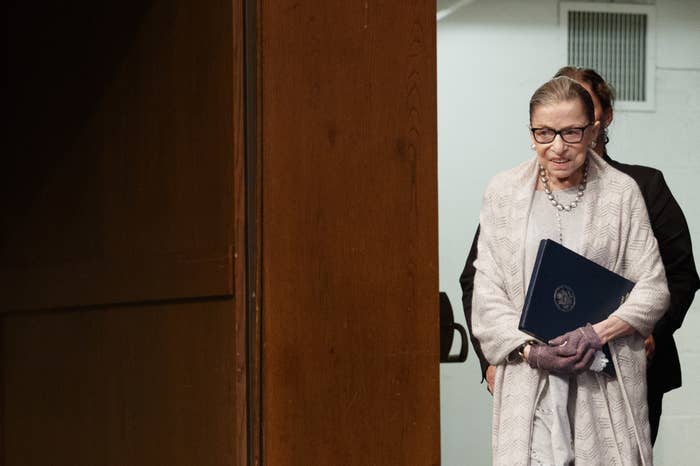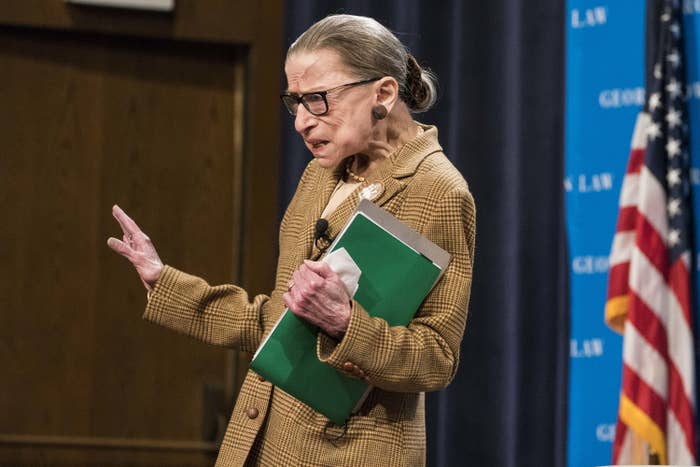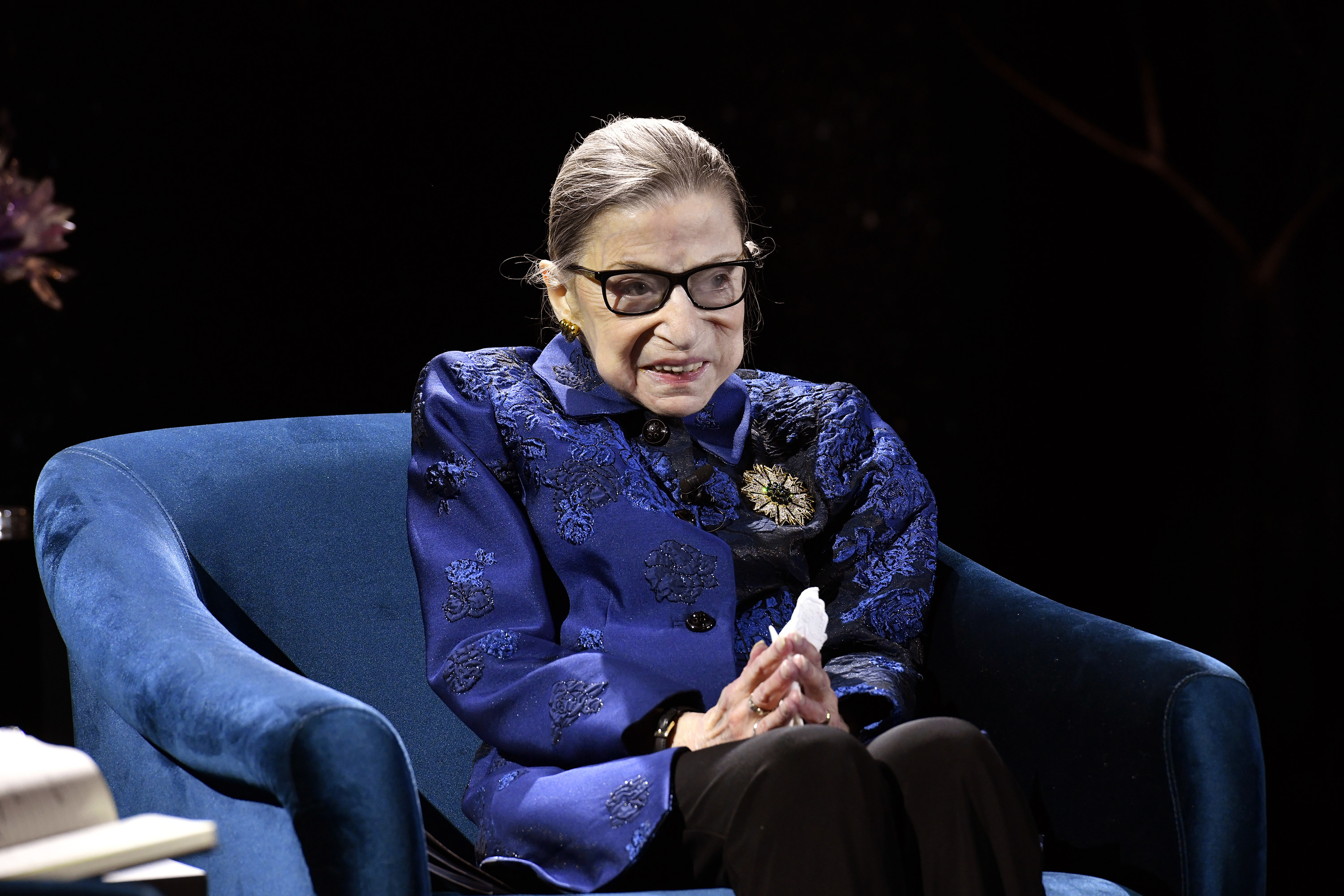
During her nearly three decades on the high court, Justice Ruth Bader Ginsburg’s Supreme Court opinions gave voice to women fighting for equal rights and opportunities. Ginsburg herself came out of the women's liberation movement of the 1960s and 1970s, and as a young lawyer, she argued a number of key gender equality cases in the courts before eventually being nominated to a federal appeals court in 1980 and then the Supreme Court in 1993. Here are some of her more famous opinions.
Not long after joining the court, Ginsburg wrote the majority opinion in a 1996 case called the United States v. Virginia. The case considered whether the Virginia Military Institute could continue to exclude women from what was then an all-male institution. As in so many opinions, Ginsburg didn’t resort to flowery language, but instead cut straight to the point.
“Generalizations about ‘the way women are,’ estimates of what is appropriate for most women, no longer justify denying opportunity to women whose talent and capacity place them outside the average description," Ginsburg wrote.

Ginsburg, who enrolled at Cornell University at the age of 17 and eventually graduated from Columbia Law School at the top of her class but couldn’t easily find work as a lawyer in New York City, could have been writing about herself. Every justice with the exception of conservative Antonin Scalia signed on to the relatively new justice's opinion. The Virginia Military Institute was the last all-male public college in the country, but the decision had wider implications, effectively striking down any law which, as Ginsburg put it, "denies to women, simply because they are women, full citizenship stature—equal opportunity to aspire, achieve, participate in and contribute to society based on their individual talents and capacities.”
That was an early victory. But many of Ginsburg’s most memorable opinions were dissents, in which she wrote for the losing side. As Jill Lepore in the New Yorker noted on Friday night, Ginsburg once said “the most effective dissent spells out differences without jeopardizing collegiality or public respect for and confidence in the judiciary.”
In 2007, Ginsburg broke with tradition and read her dissent aloud in an effort to bring attention to the gender pay gap. The case was Ledbetter v. Goodyear. Lilly Ledbetter, a retired Goodyear employee, sued the company for gender discrimination after she discovered that throughout her 19 years at the company, she had been systematically paid less than her male counterparts.
In a 5–4 decision, the Supreme Court dismissed Ledbetter’s claim, ruling that according to the Civil Rights Act of 1964, she only had 180 days after an instance of discrimination to take her employer to court. In her dissent, Ginsburg pointed out that Ledbetter couldn’t have filed her lawsuit any sooner because she wasn’t aware of the years of discrimination she faced until years after the fact. Ginsburg reasoned this was how racial and gender disparities often cropped up, revealing themselves slowly.
“The Court’s insistence on immediate contest overlooks common characteristics of pay discrimination,” she wrote. “Pay disparities often occur, as they did in Ledbetter’s case, in small increments; cause to suspect that discrimination is at work develops over time. Comparative pay information, moreover, is often hidden from the employee’s view.”
"Her initial readiness to give her employer the benefit of the doubt should not preclude her from later challenging the then current and continuing payment of a wage depressed on account of her sex."
Ginsburg called on Congress to pass legislation that would overturn the court’s decision. One of the first bills signed into by President Barack Obama was the Lilly Ledbetter Fair Pay Act of 2009, doing just that.

During her early years on the court, Ginsburg was one of two women justices. After Sandra Day O'Connor's retirement in 2006, Ginsburg spent several years as the court's lone female voice. That hit home during oral arguments in the case of Safford Unified School District v. Redding, where the court had to weigh whether a male assistant principal had violated a 13-year-old girl's rights when he forced her to remove her bra and underpants while searching for drugs. While the court decided that the assistant principal had violated the girl’s rights, the court also ruled that the school district was entitled to qualified immunity.
"They have never been a 13-year-old girl," Ginsburg later told USA Today. "It's a very sensitive age for a girl. I didn't think that my colleagues, some of them, quite understood."
In 2014, Ginsburg vehemently dissented in yet another women’s rights decision by the court’s conservative majority. In Burwell v. Hobby Lobby, the court ruled that companies could, on religious grounds, refuse to comply with the Affordable Care Act’s mandate that health insurance plans cover birth control.
“Where is the stopping point,” she wondered. “Suppose an employer’s sincerely held religious belief is offended by health coverage of vaccines, or paying the minimum wage, or according women equal pay for substantially similar work?”
It wasn’t just on issues of gender equality that Ginsburg crafted sharp-tongued dissents. In 2013, she dissented in the Shelby County v. Holder, which gutted the section of the Voting Rights Act that required states with a history of discriminating against minorities at the polls, clear plans with the Justice Department, getting what was called preclearance, before making sweeping changes to voting procedures.
“Throwing out preclearance when it has worked and is continuing to work to stop discriminatory changes,” Ginsburg wrote, “is like throwing away your umbrella in a rainstorm because you are not getting wet.”
In a 2016 essay published in the New York Times, which was adapted from a book she published the same year, Ginsburg reflected on how far the women’s movement had come in her lifetime. She also noted that the battle for equality was far from won, that women still earn less than men, and that they do not have the same protections in many places.
And yet, she ended, as she often did, in a place of optimism and hope, writing: “I am optimistic, however, that movement toward enlistment of the talent of all who compose 'We, the people,' will continue."
